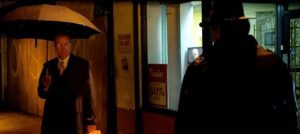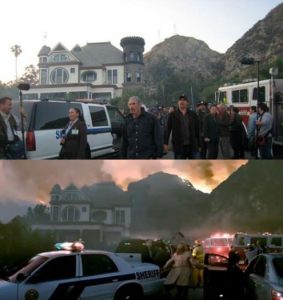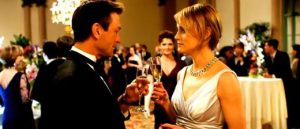BY STEPHEN BROWNE
In the former Soviet republic of Belarus rules Europe’s last authoritarian dictator. His brutal crackdown on dissidents in December generated controversy, around which many questions remain. Jaroslav Romanchuk has answers.
n official at the Minsk office of the Organization for Security and Cooperation in Europe once explained the country in one sentence.
“Belarus is the Soviet Union,” he said. “It’s the rest of the country that disappeared.”
There is a huge bronze statue of Lenin in front of parliament, red stars and the hammer-and-sickle festooning public buildings, and they still call the secret police the “KGB.”
Belarus is a little smaller than Kansas, with a population of about 9.6 million. Once one of the constituent republics of the USSR, Belarus declared “sovereignty” in 1990, and independence in 1991 following the collapse of the Soviet Union. Since 1994 Alexander Lukashenko has been president. During his term he has continued the policy of state ownership of the means of production, suppressed opposition — often brutally — and manipulated media and election results to keep himself in power.
Jaroslav Romanchuk is vice-president of the opposition United Civil Party, their 2010 presidential candidate, and a leading intellectual of the nascent Belarussian libertarian movement. He is also a popular figure at Objectivist and libertarian events in the United States.
After hearing reports Romanchuk was arrested, or forced to make public statements under duress, and accused of cooperating with the regime, several members of The Atlasphere donated funds to help send reporter Stephen Browne to Belarus to investigate.
Subsequently other dissidents in the opposition condemned Romanchuk for allegedly making libelous statements about presidential candidate Andrei Sannikov and his wife Iryna Khali, who at the time of this writing remain incarcerated in the KGB prison. On February 7 the leaders of the UCP voted a motion of no confidence, though Romanchuk retains his position as vice-president at the time of writing.
The interviews took place in Romanchuk’s apartment in Minsk over three days during the week of January 8 to 15, 2011. He agreed to the interviews, though suffering from a touch of the flu and three previous interviews with the KGB.
The Atlasphere: Tell us about yourself — where you come from, your background, and how you became a libertarian economist.
Jaroslav Romanchuk: I was born in a small town in the Grodno region, of 2,000 people, so I’m a rural guy. Graduated from university with flying colors. Then I was into business, I was in the parliament, I did a lot of research, I ran a newspaper, I was involved in many, many, activities.
In 1993 I met Charles and Susannah Tomlinson in Minsk, in the People to People exchange, and they gave me Atlas Shrugged as a gift. The book turned my life upside down and I became so involved with it that I quit business and decided to pursue an intellectual career.
In 2010 I was chosen by my party, the United Civil Party, to run for president.
They gave me Atlas Shrugged as a gift. The book turned my life upside down and I became so involved with it that I quit business and decided to pursue an intellectual career.
My program was quite constructive, based on the ways to apply theory of liberty to practical problems in my country, and I’ve succeeded much because of polls, one week before the election, showing my popularity rating was at about 10 percent.
I have also written eight books of my own and more than fifteen hundred articles. I run my website, I have video and audio blogs on a regular basis. I am proud to be one of the multipliers of knowledge in my country.
I think we’ve expanded the foundation of liberty in Belarus, though the country is far from free. It’s an authoritarian country that is run by a ruthless dictator, but the people are there, the ideas are there, and it’s just a matter of time before these ideas become much stronger.
TA: What are some of your other libertarian influences? You’ve mentioned Ayn Rand, who else do you think is an important thinker?
Romanchuk: Well Ayn Rand definitely. Ludwig von Mises, Rothbard, Kirzner, Reisman, just to name a few. Of course Friedrich von Hayek and, in the methodology of science, Carl Menger. The people who created the foundations of an absolutely new science of human action.
TA: Libertarianism has been accused of being “theory heavy” and “experience light” — of being able to envision what a free society would look like, but being a little weak on telling you how to get there. In Belarus obviously you have to concentrate on how to get there. Could you tell us something of how you envision making the change from a command economy in an authoritarian state to a free society with a free market economy?
Romanchuk: It’s a long-term effort. That’s why you have to be very patient about how to structure your work, and how you advocate for change.
We have a flat-rate 12 percent personal income tax, which is the envy of many western countries. We are one of the easiest countries to register a business in.
We began to produce different programs and concepts, and draft laws to address the most topical issues of the day. We’ve been quite successful at working with the entrepreneurs of the country.
Jointly we produced the national business platform, which is a set of recommendations on how to improve the business climate, how to improve property rights, taxation, licensing, the information environment, and how to improve governance. And we have concrete proposals about how to do that.
That is why we have achieved some very good success, even here in Belarus, which is far from being a free market country. We have a flat-rate 12 percent personal income tax, which is the envy of many western countries. We are one of the easiest countries to register a business in. We have also urged the government to abolish the licensing of retail trade.
So when you have been campaigning on the issues for a long, long time, when you provide good arguments, it works even in Belarus. It’s a long-term process. But in order to spread libertarianism, spread the ideas of liberty, you must be very concrete.
Switching from a centralized planned economy with 100 percent state assets to a full-fledged private economy doesn’t happen overnight. You have to know how to sell assets, how to enforce the rules of the game, and how to prevent oligarchs from capturing the state.
Our opinions are getting more and more popular, and the presidential election campaign proved that people listen to what we have to say and, more and more, accept our agenda for Belarus.
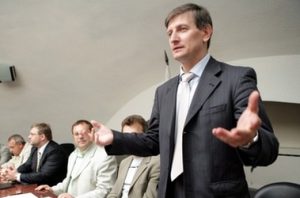
TA: Speaking of oligarchs, this is such a pleasant country with such potential. The superiority of free markets has been demonstrated again and again around the world, wherever it’s been tried. So why doesn’t the Lukashenko regime try becoming something like an authoritarian capitalism on the Singapore model? Why doesn’t he just say, “Have fun, make money, just don’t ever forget who’s in charge”?
Romanchuk: He may move in that direction. Before now there was no need for that because those in power got everything they wanted. They got cash, they got power, they got immunity from the law — so they could do anything. And the reason they enjoyed this kind of welfare and power was Russia supported Belarus at 15 to 20 percent of GDP a year.
Plus we had very easy access to the Russian market. We have two oil refineries, and Russian oligarchs and Belarusian oligarchs turned Belarus into a kind of offshore refining territory. We are also one of the biggest exporters of potash fertilizer in the world. And the Belarusian people are very hardworking.
However 2010 was the last year the situation was stable. The IMF made loans, and the national bank printed money to loan to enterprises, and so at the end of the day we’ll have high inflation. In 2011 we’ll have a very bad situation in the banking sector; the system is doomed.
Lukashenko will have to sell assets, and right now it’s unclear how he will react. He will either move to a North Korea type of model or to a Singaporean model. I don’t think there is any other alternative right now.
We have the opportunity in Belarus to avoid the kind of mistakes that were made by transitional countries in Eastern and Central Europe in their move to capitalism. But in order to do that, we have to present this alternative and persuade the authorities to accept it.
But from what I see right now there is no political will to move in this direction. The authorities don’t know which way to move. And in this situation of course the best strategy is to be patient, be present in intellectual debate, and be able to present the alternative.
Not a single country in the post-socialist era decided to destroy the monopoly of a central bank over money.
TA: What are some of those mistakes you are referring to, in the transition to free market economies in countries like Poland, the Czech Republic, and elsewhere?
Romanchuk: Well first, copying the tax system of the United States and the European Union was the biggest, the gravest mistake. If you want to have a good tax system, you must not copy that of the European Union.
In many countries now the state distributes around 45 percent of GDP, and of course that’s just a different form of socialism rather than anything to do with capitalism.
Not a single country in the post-socialist era decided to destroy the monopoly of a central bank over money. We still have money that is nationalized by the government. That is why the government and central banks create bubbles, destroy wealth, redistribute wealth, and create a lot of distortions in the market.
You must avoid protectionism, and again I cannot name a single European or Central Asian country which stands up for free trade and abolishes all trade barriers.
TA: Would you tell us something about the current situation in Belarus? Not a great many people in the west know anything about this country.
Romanchuk: Belarus is located between Russia and Poland (to the east and west) Lithuania and Ukraine (to the north and south), so it’s the heart of Europe. It’s an authoritarian country with no political and civic liberties. Belarus is the last centrally planned economy in the region, with predominant state ownership of the economy. So the government is the biggest owner, the biggest job creator, the biggest manager, and we are the only country where the KGB kept its name.
Many of us in Belarus are trying not just to survive, but to promote liberty. We’re fighting against great odds but we’re providing a good alternative to the people. That is why we take part in civic society activities, in political activities, in order to reach out to as many people as possible.
Belarus was one of the most developed Soviet republics. Its infrastructure is quite well developed, compared to Russia or Ukraine. The reason the regime is moderately popular is that it delivers on some social security issues. It’s quite safe to be in Minsk or any town in Belarus. Roads are OK, health care institutions operate well enough.
It’s worth studying why Belarus delivers something that other centrally planned economies don’t, but this is only comparatively speaking: When the government controls the media, when just a tenth of the citizens have travelled abroad, then media becomes a source of manipulation and propaganda that Belarusian authorities use.
Belarus is a nice country, with wonderful nature, but we are unfortunate to have an authoritarian regime we’ve been fighting for 16 years.
TA: But unlike the darkest days of the Soviet Union, you obviously are able to form opposition parties. You are able to engage in activity, even though there is a KGB headquarters not far from here?
Romanchuk: (laughs) Not far from here.
TA: And the streets are full of uniformed men at all hours — militsia, OMON, and such.
Romanchuk: We have a situation different from a Soviet-style totalitarian regime where anybody with a different mindset could be arrested or put into a psychiatric clinic. Ours is an authoritarian regime where the government allows some kind of activities. We can publish articles on our websites, we can publish books, we can hold different events — provided they have an innocent “politically correct” agenda like management, PR campaign, etc.
Continued on January 12, when Romanchuk had just returned from a trip to Lithuania.
TA: What were you doing in Lithuania? What are your priorities there?
Romanchuk: Now the most important thing is to explain to people what happened in Belarus. To meet experts, diplomats, journalists — to collaborate on what to do next and to consolidate our actions to free our imprisoned political dissidents.
That was a very, very tough night. We expected even murders because of the very emotional response of the authorities.
TA: So what did happen in Belarus? What happened in the election and the aftermath?
Romanchuk: The election campaign was more-or-less liberal — by Belarusian standards. We could campaign, we could collect signatures, we could go around the country to meet people, and this time we didn’t have to ask permission to have meetings. With of course some obstacles, we could print materials, papers, and leaflets.
That was relatively free, and everybody expected the final day would be like this too.
On December 19th I voted and we had another press conference. We waited until 8 p.m. because that’s when we asked our voters to meet on the main square of the town.
During the press conference I said the campaign was OK, but the fundamental point was whether we had a fair vote count. We had numerous cases of violation of the process, falsification of vote counts. Many people were forced to come and vote early, and of course there were reasons to believe this time the election would also be falsified.
We got the first exit polls, which said the incumbent president wouldn’t be able to win in the first round — since more than 50 percent is required for a first-round win — while I got about 10 percent of the vote. My team and I got together and marched to Oktyabrskaya Square. There were 20 to 25 thousand people in the square.
We had a small rally and, from what I saw, there were some candidates who took responsibility for the arrangement of the square. They were not quite ready, the response was quite weak, and they decided to march to a different square in town, in front of the house of the government.
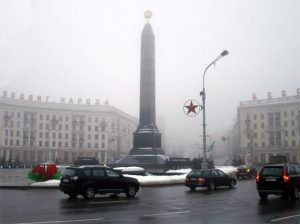
As it turned out, there was a trap there, a provocation. I don’t know whether they knew about it or not, but the fact was that people went there and somebody began to attack the house of the government.
That was the very brutal part of the evening. The police stepped in, dispersed the crowd, and more than 600 people were imprisoned, including seven presidential candidates.
That was a very, very tough night. We expected even murders because of the very emotional response of the authorities to the situation.
TA: Were you warned in advance about agent provocateurs?
Romanchuk: From what I learned later, there were many facts proving it was either KGB or Russian FSB, or somebody else involved in staging provocations. But the fundamental blunder was to lead people from one square where there was an official meeting of a peaceful demonstration, to where the trap was staged. I don’t know who staged that.
And then I was told by my Russian friends that they knew two weeks in advance that provocations were being prepared right in front of the house of the government.
Of course the authorities were afraid the campaign would be peaceful and constructive and many more people would vote for us. So they believe the best way to get rid of the opposition was to portray us as losers, as rebels, as revolutionaries without any constructive program.
I think there must be some provocateurs among some candidates on the ballot. Then all alternative candidates were described as people who are worthless, as people who are for a coup d’etat.
There were nine candidates in the primary. It is my understanding that the authorities rigged the process by putting candidates on the ballott who did not collect the 100 thousand signatures necessary for registration. And then when they saw that some people like myself managed to attract voters who weren’t already pro-democracy, pro-free market reforms, then they decided to put that hooligan label on everybody.
My campaign was based on free market ideas, on openness, on privatization, and job creation by entrepreneurs.
And now members of my team are put in jail, to eliminate democratic political parties and to put dirt on everybody.
TA: And you got about 10 percent of the vote?
Romanchuk: I got about 10 percent of the vote, according to independent opinion polls and exit polls the day of the election.
But if you combine the votes that my colleagues got, it is obvious that — as suggested by the Polish Minister of Foreign Affairs Radek Sikorski —Lukashenko did not win in the first round, by getting the 50 percent required to avoid a runoff.
I think that was one of the reasons why the reaction to the square was so emotional. Another thing was that there were obvious provocations. The interesting question was whether these were only from Belarusian authorities, or whether there was some involvement from Russia, or whether some presidential candidates were involved in discrediting all the democratic forces. Because there are people who have nothing to say but, “Lukashenko is bad, choose me.”
My campaign was different. My campaign was based on free market ideas, on openness, on privatization, and job creation by entrepreneurs. That was different from the previous agenda of Belarusian opposition, and that is why the authorities didn’t know what to do about me. So they decided to put me in the rank of those people who had nothing to say, but maybe it was part of the provocation.
TA: What happened in the aftermath? Who among the opposition is in jail? And what happened to you? Did you see Lukashenko?
Romanchuk: That night when everybody was being arrested and harassed, I had a very long and very tense three-hour meeting with representatives of the authorities, and they told me if I didn’t make a statement people might be murdered or put in jail for life. The pressure on the system was so tense, and Lukashenko was so nervous that things could have gotten out of control and much bloodier.
So I faced a choice, whether I could save people, release the pressure, and reason with the authorities so they would stop this chaotic assault.
That was definitely one of the most difficult times of my life. But I had to do that to save lives and keep people out of prison. The next day I got a call from the presidential administration about the leader of my party, Anatoly Lebedko. He was detained when the door to his apartment was kicked in and he was dragged out by the hair. It was very brutal.
So I was very much afraid for his life and I thought if I could help him out of prison and at least keep him alive, that should be my top priority.
He is in KGB prison right now, and my number one goal is to release him from prison, because he’s a member of my team and he has never taken part in any bloody provocation. He was part of my constructive campaign. I think he was taken by police as part of this wide-scale campaign to destroy the opposition.
TA: Has anybody seen him in prison?
Romanchuk: Yeah. He saw an attorney and hopefully he’s well. He was on a hunger strike for about five days but then he stopped because he realized it wasn’t going to be a one-week detainment. His situation is much more difficult.
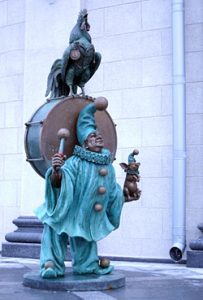 I don’t know, but I hope he will be released in the near future. But that night, my biggest concern was to have everybody alive, before even free. Because the situation was really, really very tense. When everybody is out of prison, when everybody is free, then we can have a more reasonable discussion.
I don’t know, but I hope he will be released in the near future. But that night, my biggest concern was to have everybody alive, before even free. Because the situation was really, really very tense. When everybody is out of prison, when everybody is free, then we can have a more reasonable discussion.
TA: To those of us who were watching from outside the country, it looked like you were making statements under duress, and according to a Google translation of an interview with your mother, your mother said you were making statements under duress.
Romanchuk: Well that would be an understatement! If you are beaten, that’s one thing. But there are many other forms to urge you to say something. But again, fundamentally the issue was the lives of the people. And in this situation I made the choice I made because I wanted to save people.
At that time I didn’t think about my political career, about anything else, about what people would say, because at that time the situation was out of control. The person who made decisions was definitely off-balance and he could have given orders that would have lead to a much worse situation for everybody.
TA: Is there anything you said that you’d retract now?
Romanchuk: Anatoly Lebedko and the people in detention must be free. Then we can have a thorough investigation of what happened. When you want to save your friends in the first place, you think about the political consequences later.
If you’re in front of a firing squad, it doesn’t matter if you wear a suit and tie, or sporting boots and trainers. We can talk about statements and word choice later. Right now I want to have my friends out of prison, out of danger, and that night the danger was absolutely imminent and real.
For me the fundamental choice is the lives of the people.
TA: Did you come under criticism from some other members of the opposition about this?
Romanchuk: Oh yeah, absolutely. I’m still getting a lot of criticism.
It’s important to remember that the nine candidates were not part of one team. We tried to make attempts to come up with a single candidate, but failed. We tried to cooperate with some alternative candidates — for example, Mr. Nekliayev, until August — then he withdrew from the cooperative effort. Then some presidential candidates wanted me to give up and join their teams. And that is why we ran our own campaign.
I ran a very open, very low budget campaign. I spent all my personal savings on it. That is why the criticism of the campaign is not about myself, it’s about the choice. For me the fundamental choice is the lives of the people. If there is any danger to the lives and health of the people, you must take care of these things first, before considering anything else.
If other people believe I should have taken responsibility for deaths of the people, I wasn’t ready for that, and that is why I made this choice. I still believe that people must be free. I still believe in having free and fair trial for everybody who is under arrest right now. And of course I do not recognize the elections as free and fair; the results have been falsified.
So people didn’t know the circumstances, they didn’t know the motives, and I tried to explain as much as I could, because, at that time — and even now — I can’t talk and elaborate more because during the investigation I signed a KGB paper agreeing not to talk about the case. If I violate that I can go to prison.
TA: Did somebody actually say, “Well Stalin sacrificed his own son”?
Romanchuk: Well for me the situation is not all black and white, like Lukashenko is black and the opposition is white. The opposition has different elements — and of course some people made the decisions to lead people into the trap. So the question is whether they did that consciously as part of somebody else’s plan, or if they were fooled into acting like that. And of course they should take responsibility.
All western European countries and America insisted on peaceful demonstrations after the election — and that’s what we wanted. Other people didn’t like that.
But other people like Anatoly Lebedko, I’m 100 percent sure he hasn’t been involved in any plots. Other people from my party who were there, they weren’t involved in any plots. They were there for a peaceful demonstration, because we’re planing a long-term strategy of the country’s democratization.
All western European countries and America insisted on peaceful demonstrations after the election — and that’s what we wanted. Other people didn’t like that.
And now as the smoke clears we see that Lukashenko is one-and-one against the Kremlin, and has very bad relations with the West. It’s almost complete self-isolation.
So who has won? Some forces who were instrumental in having that provocation staged. Belarus as a sovereign state is facing very difficult challenges, and some candidates I believe played a part in this.
The brutality of the police must be investigated, that is obvious. People must be freed. At the same time, when such things happen, and if some presidential candidates participated in the provocation, there should be a fair trial and punishment. But now the KGB says up to 15 years in prison, and that is definitely out of the question.
TA: What are the charges?
Romanchuk: Of inciting a coup d’etat.
TA: So this is much more than merely inciting to riot?
Romanchuk: Of course. Incitement and mass protest or mass disorder is one thing. But coup d’etat is a very, very grave accusation. We should have evidence, if that crime ever happened.
So from what I know, that kind of campaign is meant to block activities of all democratic forces, leading to arrests and assaults on independent media, on human rights organizations. Now the arrest and search campaign is everywhere. Anybody can be searched, arrested, summoned to KGB anytime, any day. We are like on a volcano.
TA: How many times have you been to the KGB headquarters?
Romanchuk: I was there three times for interrogation in this case.
The authorities say, “If you have any ideas….” And I share ideas.
TA: And do you expect to be hauled in again? Do they arrest you or do they just tell you to show up?
Romanchuk: They told me to show up, and if I didn’t show up they would come and arrest me. If I had wanted to hide, I would have hidden on December 19th. But I’m innocent and my friends are innocent and that’s why I want to protect them by being free and using this opportunity.
TA: You said they’ve threatened you. Have they tried to offer you anything? There was a story in one publication that you might be offered a position in the government.
Romanchuk: Bullshit! Complete bullshit! Nobody offered me any position at any time.
Of course the authorities use my ideas, use the programs that I’ve presented to the government. We’ve been quite constructive for many years and many proposals that we’ve made have become part of legislation. For example, the personal flat income tax at 12 percent.
TA: Russia did that too, didn’t they?
Romanchuk: Yeah, personal income tax at 13 percent, but Belarus did it two years ago.
The other thing is Belarus is in the top ten countries in the world in terms of the ease of entering business, which is again part of our activities. Another of our suggestions is abolishing licenses for retail trade.
So these kind of activities have been going on for many years. Nobody offered me any position, but they say, “If you have any ideas….” And I share ideas. I send books, articles to the government all the time and I give them feedback and ideas about what should be done if they care about having free market reforms.
TA: As far as the opposition goes, I would say you are on the extreme classical liberal/libertarian wing. Obviously the opposition is not all like that.
Romanchuk: Most of the opposition is more like social democratic/socialist, unfortunately, but there is a huge deficit of people with a constructive mindset.
That is why my party is the only serious political structure with a serious program that Lukashenko considers as an alternative to his own. That is probably one of the reasons I was not arrested — because they wanted somebody to generate ideas.
And when I generate ideas, one thing I say is, “OK you have my books and concepts, but another thing is how to understand them.”
One thing we’ve been working on is ways to improve the business climate further, through tax reform, licensing reform, property rights, and privatization. It’s like pieces of the puzzle. You know all the pieces but you don’t know how to get all the pieces together. That is why I think if they are serious about reforms they will definitely address these issues.
Of course the KGB followed every step of every candidate, all the time. And during the 28 days of the campaign I visited 35 towns. I made official presentations and they were on media, on audio, so they saw that I’m a constructive person.
For me fighting for the liberty of my country is not saying, “Lukashenko is bad. I’m good. Vote for me.” That was a very simplified version of some of the candidates’ programs.
That is why my program, philosophically, was to turn people’s attention in Belarus to libertarian ideas in various forms, in the areas they care about. They care about jobs. They care about savings. They care about open trade. They care about production, and I told them the best way to do that is just to have a free market, to have liberty, to have freedom of exchange, to have private property.
The system, just like in Atlas Shrugged, is falling apart. We have to give people an alternative which is based not on exploitation, but rather on individual liberty and the basic foundations of capitalism.
That is why I think I’m opposed from inside the opposition too. Ideologically they’re much closer to Lukashenko in terms of economic policy, in terms of running the country, than myself.
TA: On the philosophical side, what would you say to people who say bourgeois liberty is a Western, or even specifically Anglo-Saxon, concept that doesn’t transfer to other cultures?
Romanchuk: That’s like talking about anatomy or physics that doesn’t apply to Slavs. I don’t believe in this geographically based explanation of culture.
The philosophy of liberty originated in Britain, but at the same time we know many outstanding French philosophers who contributed to the development of the philosophy of liberty. We have Austrians — we have people all over the world. I’m in Belarus, but I also contribute to the development of the ideas of liberty. I’m a Slav but does that mean I can’t appreciate Anglo-Saxon culture?
My premise is there is no Anglo-Saxon, French, or Continental division in the ideas of liberty.
The size of the government in Great Britain is more than 50 percent of GDP, similar to France. In the United States the size of the government is over 43 percent of GDP. Whatever you call it — Anglo-Saxon, Continental, whatever — you have the situation where interventionists own half of our economies and countries.
That’s not the culture that goes back to the roots of Adam Smith, or John Locke, or Menger — that’s the culture of socialism, of interventionism, of statism, where people must toil for somebody else. And that was a trap built by Western philosophers and supported by Soviet-style interventionism all over the world.
I believe we must challenge this mainstream world culture of grayness, moral ineptitude, and interventionism and build on the system of capitalism.
Because the system, just like in Atlas Shrugged, is falling apart. Financial and world trade crises will definitely follow in the next five years, and we have to give people an alternative which is based not on exploitation, but rather on individual liberty and the basic foundations of capitalism.
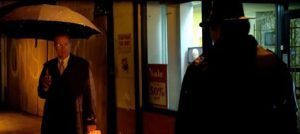
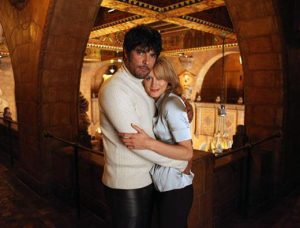
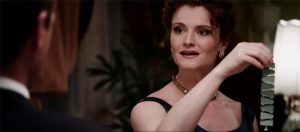

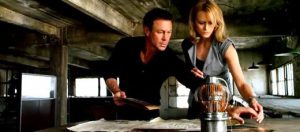



 I don’t know, but I hope he will be released in the near future. But that night, my biggest concern was to have everybody alive, before even free. Because the situation was really, really very tense. When everybody is out of prison, when everybody is free, then we can have a more reasonable discussion.
I don’t know, but I hope he will be released in the near future. But that night, my biggest concern was to have everybody alive, before even free. Because the situation was really, really very tense. When everybody is out of prison, when everybody is free, then we can have a more reasonable discussion.